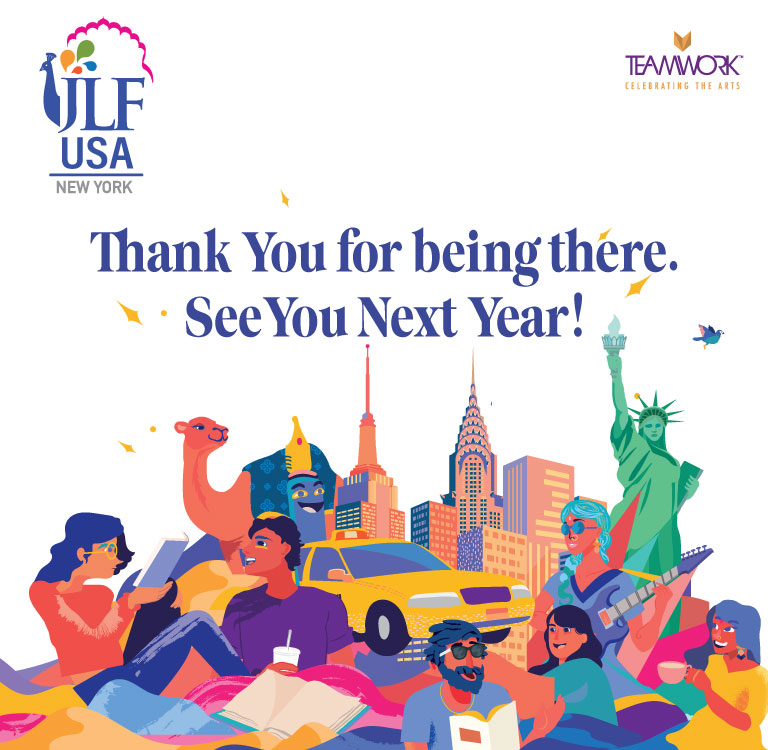

Program
Program subject to change
Music
Zila Khan
Musical performance by Zila Khan
Inaugural Address: Imagining Our Worlds
Address by Namita Gokhale, William Dalrymple, Indian Ambassador to the United States Navtej Sarna, Sanjoy K. Roy and Asia Society Executive Vice President, Tom Nagorski
Kohinoor: The Light of the World
Navtej Sarna and William Dalrymple introduced by Navina Haidar
The Kohinoor is the world’s most famous diamond but its history is shrouded in mystery. William Dalrymple and Anita Anand’s recent book blows away the legends to reveal a true history stranger, and more violent, than any fiction. Navtej Sarna’s passionate biography, The Exile, is a poignant novel about Maharaja Duleep Singh, the younger son of the great Maharaja Ranjeet Singh of Punjab, who signed away the Kohinoor to Queen Victoria when he was only 11. Together, they present the riveting story of the Kohinoor, the light of the world.
The Written World
Martin Puchner introduced by William Dalrymple
The story of how literature shaped world history, from Alexander the Great and the Iliad to Don Quixote and Harry Potter and the ZEE Jaipur Literature Festival. In this groundbreaking talk, Harvard Literature professor Martin Puchner leads us on a remarkable journey through time and around the globe to reveal the powerful role that stories and literature have played in creating the world we have today. Puchner introduces us to numerous visionaries as he explores 16 foundational texts selected from more than 4000 years of world literature and reveals how writing has inspired the rise and fall of empires and nations, the spark of philosophical and political ideas and the birth of religious beliefs. We learn of Benjamin Franklin's pioneering work as a media entrepreneur, watch Goethe discover world literature in Sicily and follow the rise in influence of The Communist Manifesto. We visit Troy, Pergamum and China and we speak with Nobel laureates Derek Walcott in the Caribbean and Orhan Pamuk in Istanbul as well as the wordsmiths of the oral epic Sunjata in West Africa. Throughout The Written World, Puchner chronicles the inventions, writing technologies, the printing press and the book itself that have shaped religion, politics, commerce, people and history, showing how literature turned our planet into a written world.
Medical Narratives: The Pulse of the Story
Sandeep Jauhar in conversation with Sanjoy K. Roy
Medical narratives reassert the primacy of the body in our understanding of the world. Practicing cardiologist Sandeep Jauhar’s book, Heart: A History, combines his families own moving history of heart disease with gripping scenes from the operating theater. In conversation with Sanjoy K. Roy, he speaks of the narratives of the body and the choices we make in our search for health and balance.
Shakespeare: The Year of Lear
Preti Taneja and James Shapiro in conversation. Introduced by Gauri Viswanathan
In his book The Year of Lear, eminent Shakespeare scholar James Shapiro shows how the tumultuous events in1606 influenced three of Shakespeare’s greatest tragedies. Preti Taneja’s We That Are Young transports Shakespeare’s King Lear to the contradictions of New Delhi, and is a devastating commentary on contemporary India. Together, they speak of the Bard of Avon, and his greatest and most evocative work.
The Intelligence of Tradition
Molly Emma Aitken and Navina Haidar in conversation with William Dalrymple
Molly Emma Aitken and Navina Haidar’s work on the miniature paintings of Rajasthan has revolutionised our understanding of the courtly world and family ateliers that produced them. These leading art historians discuss their different approaches and artistic enthusiasms in conversation with William Dalrymple.
The City of Many Tongues
Alia Malek, Kayhan Irani, Ross Perlin, and Ruchira Gupta in conversation with Kanishk Tharoor
New York is a multi-sensory and multilingual metropolis, and has been described as the capital of language density. Fifty-one percent of New Yorkers speak only English at home and the other forty-nine percent also speak languages from across the globe. A session that speaks to writers and journalists of bilinguality, mother languages, lost lullabies, and the joys of communicating in what has been described as "the Babylonian bedlam" of this uniquely stimulating city.
India Sutra
Shashi Tharoor in conversation with Namita Gokhale
A fascinating conversation with Shashi Tharoor, charismatic politician and bestselling author of 16 works of fiction and non-fiction, centered on India and its history, culture, religion, foreign policy and cricket. He speaks of the consequences of colonialism and the impact of inglorious empire, on his interpretation of the Hindu faith and of his fascination with South Asian cricket and the turbulent passions attached to it. In conversation with writer and journalist Tunku Varadarajan.